Qatar’s prime minister accused Israel of “state terrorism,” and said its attack in Doha last week targeting Hamas’s leaders was “an attack on the principle of mediation itself,” but nevertheless vowed to continue efforts to reach a ceasefire.
Sheikh Mohammed bin Abdulrahman Al-Thani, who is also Qatar’s foreign minister, made the remarks at a preparatory session on Sunday for the emergency Arab-Islamic summit in Doha, which was called for Monday in the wake of last week’s bombing. Israel has defended the September 9 strike, even as Prime Minister Benjamin Netanyahu hinted that it was not successful.
At Sunday’s meeting, foreign ministers of the participating nations came together to write a draft resolution to be adopted the following day. Thani, whose government has acted as a key mediator in ceasefire negotiations between Israel and Hamas in Gaza, stressed that the moment had come for consequences to Israel’s attacks in the wider Middle East.
“This attack can only be described as state terrorism, an approach pursued by the current extremist Israeli government, which flouts international law,” he said. “The reckless and treacherous Israeli aggression was committed while the state of Qatar was hosting official and public negotiations, with the knowledge of the Israeli side itself, and with the aim of achieving a ceasefire in Gaza.”
Nevertheless, he said, Israel’s “practices” will not stop Doha’s mediation efforts with Egypt and the US to end the war in Gaza.
He added, in footage later released from Sunday’s closed-door meeting, “It is time for the international community to stop applying double standards and punish Israel for all the crimes it has committed.”
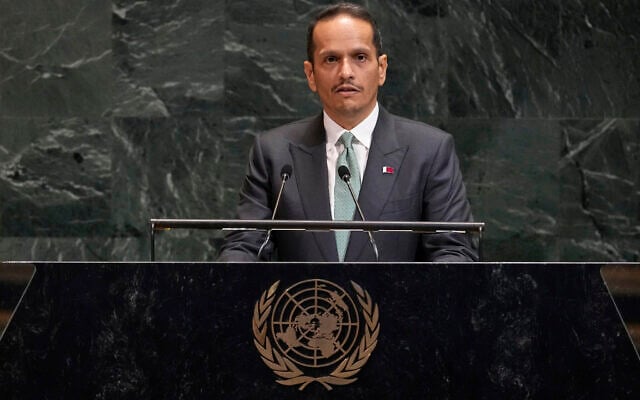
Qatar Prime Minister and Foreign Minister Sheikh Mohammed bin Abdulrahman bin Jassim Al Thani addresses the United Nations General Assembly, July 28, 2025. (AP/Richard Drew)
The draft resolution that emerged from Sunday’s meeting, which was seen by Reuters, did not mention any diplomatic or economic moves against Israel, but warned that its activity threatens the normalization of ties. The resolution may change before the leaders meet in Doha on Monday.
An excerpt of the draft resolution seen by Reuters said that “the brutal Israeli attack on Qatar and the continuation of Israel’s hostile acts, including genocide, ethnic cleansing, starvation, siege and colonizing activities and expansion policies threaten prospects of peace and coexistence in the region.”
These actions threaten “everything that has been achieved on the path of normalizing ties with Israel including current agreements and future ones,” according to the draft, which was drawn up by foreign ministers meeting ahead of the summit.
Five years ago this week Israel normalized ties with the United Arab Emirates and Bahrain under the Abraham Accords, and later forged deals with Morocco and Sudan. Israel has long been pursuing normalization with Saudi Arabia, though it has remained elusive.
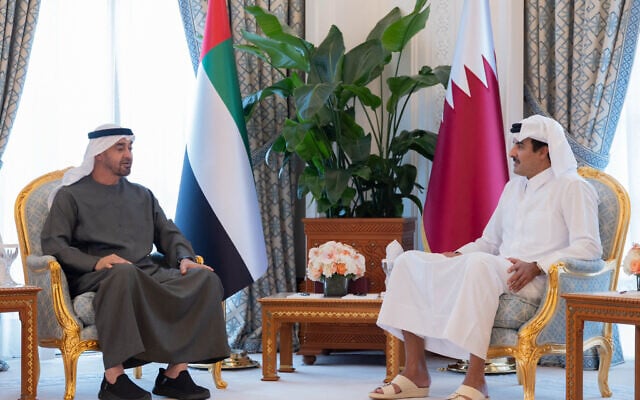
This handout picture released by Qatar’s Amiri Diwan shows Qatar’s Emir Sheikh Tamim bin Hamad al-Thani (right), meeting with UAE President Sheikh Mohamed bin Zayed al-Nahyan in Doha, on September 10, 2025. (Qatar Amiri Diwan / AFP)
On the eve of the summit, President Isaac Herzog called on Israel not to neglect its relationships with its regional allies.
There are many countries, he said at the national memorial ceremony for deceased Israeli presidents and prime ministers, “with whom, alongside disagreements, sometimes very deep disagreements, and even positions I strongly reject, Israel has extensive and significant ties with these countries, including important economic ties.”
Herzog stressed that Israel “must act diplomatically and with public diplomacy, with purpose and determination, not neglecting any arena, speaking with everyone, and being proactive. We must not forsake our ties. We must not burn our bridges.”
Israel must not “accept the isolation our enemies seek to impose upon us,” he said. At the same time, he acknowledged that “Israel has never experienced such hostility. Certainly not in the most strategic and influential arenas. The hatred of Israel is rearing its ugly head with full force.”
Though Herzog did not mention any countries by name, a source in his office said that he is referring first and foremost to the UAE.
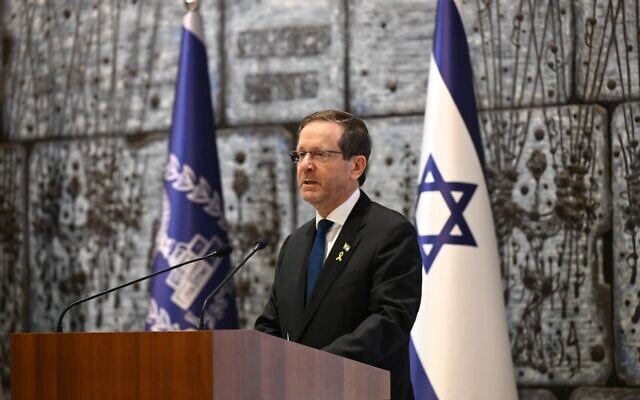
President Isaac Herzog speaks at a ceremony for fallen Israeli leaders at the President’s Residence in Jerusalem, on September 14, 2025. (Haim Zach/GPO)
The attack last week on Hamas officials was broadly condemned by international leaders, including US President Donald Trump and Secretary of State Marco Rubio, who is currently visiting Israel. But the strike, which Hamas says killed five of its members but not its leadership, has prompted US-allied Gulf Arab states to close ranks with American and Israeli adversaries.
The emergency summit brings together members of the Arab League and the Organization of Islamic Cooperation. The event aims to send a message that “Qatar is not alone… and that Arab and Islamic states stand by it,” Arab League Secretary General Ahmed Aboul Gheit told the London-based Asharq al-Awsat newspaper.
Among the leaders attending will be leaders from some of Israel’s chief regional nemeses, including Iranian President Masoud Pezeshkian. Turkish President Recep Tayyip Erdogan was also expected to attend, Turkish media reported.
Iraqi Prime Minister Mohammed Shia al-Sudani will be there, and Palestinian Authority President Mahmoud Abbas arrived in Doha on Sunday, on the eve of the summit. It remained to be seen whether Crown Prince Mohammed bin Salman, Saudi Arabia’s de facto ruler, would attend, though he visited Qatar earlier this week in a show of neighborly solidarity.
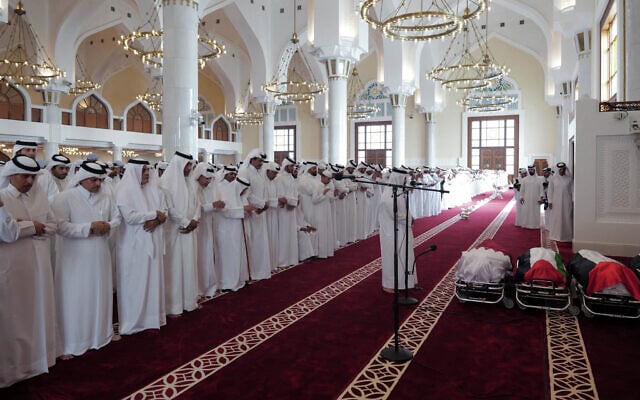
This handout picture, made available by the Qatar Amiri Diwan, shows Qatar’s Emir Sheikh Tamim bin Hamad Al-Thani (C) attending the funeral of people killed in an Israeli strike on Hamas leaders two days earlier, at Sheikh Mohammed bin Abdul Wahhab Mosque in Doha on September 11, 2025. (Qatar Amiri Diwan / AFP)
Hamas politburo member Bassem Naim said the terror group, whose October 7, 2023, attack on Israel sparked the Gaza war, hoped the summit would produce “a decisive and unified Arab-Islamic position” and “clear and specific measures” on Israel and the war.
Qatar, an energy-rich nation on the Arabian Peninsula that hosted the 2022 World Cup and is home to a large American military base, long has served as an intermediary in conflicts. For years, it has hosted Hamas’s political leadership at the request of the US, providing a channel for Israel to negotiate with the terror group.
Israel does not have formal relations with Qatar. But its eyes will be on the UAE. On Friday, the UAE summoned the deputy Israeli ambassador over the attack and subsequent remarks by Netanyahu, which it described as hostile.
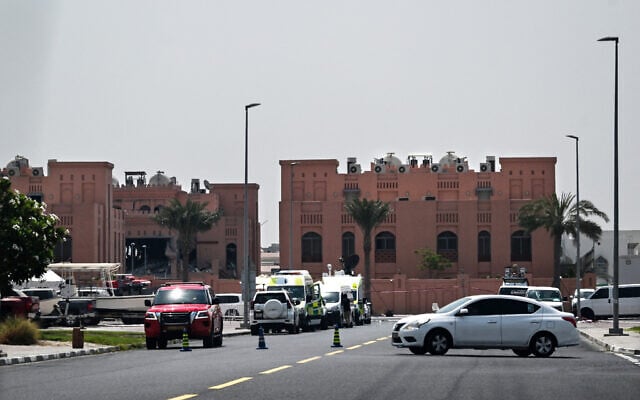
Damage is seen after an Israeli strike targeted a compound that hosted Hamas’s political leadership in Doha, Qatar, on September 10, 2025. (AFP)
The UAE has described Qatar’s stability as an “inseparable part of the security and stability of the states of the Gulf Cooperation Council,” which includes Saudi Arabia. It also recently barred Israel from the Dubai Airshow and has reportedly considered closing its embassy in Tel Aviv.
It recently threatened to reevaluate its ties with Israel over another issue, calls for Israel to annex parts of the West Bank. An envoy for the UAE told The Times of Israel that annexation would constitute a “red line” that would “end regional integration.”




